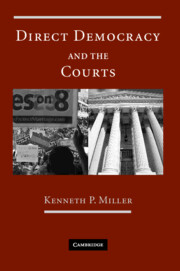Book contents
- Frontmatter
- Contents
- List of Tables and Figures
- Preface
- Introduction: A Clash of Rising Powers
- PART I THE QUEST FOR MAJORITY RULE
- PART II COUNTERING THE MAJORITY
- PART III THE MAJORITY STRIKES BACK
- Conclusion: A New Constitutional Equilibrium
- Appendix: Post-Election Initiative Invalidations
- References
- Index
Preface
Published online by Cambridge University Press: 05 June 2012
- Frontmatter
- Contents
- List of Tables and Figures
- Preface
- Introduction: A Clash of Rising Powers
- PART I THE QUEST FOR MAJORITY RULE
- PART II COUNTERING THE MAJORITY
- PART III THE MAJORITY STRIKES BACK
- Conclusion: A New Constitutional Equilibrium
- Appendix: Post-Election Initiative Invalidations
- References
- Index
Summary
As a native of California, I grew up in a state where citizens expect, as a birthright, to vote directly on questions of public policy. Multitudes in my state (and in several other states that have adopted the initiative process), regularly exercise this power. Sometimes dutifully, other times enthusiastically, we cast votes for or against citizen-initiated laws. Having participated in this process, I easily understand the appeal of a system that allows citizens to weigh the pros and cons of a policy proposal and vote “yes” or “no.”
I never considered the potential disadvantages of direct democracy until the late 1980s, when I worked for a year as a legislative assistant in the California state senate. As part of my orientation, I met with several legislative leaders. One of them said, “The initiative process has become more powerful than the legislature in this state. A big part of what we do here is clean up after ballot initiatives. You begin to feel like the guy who follows the parade and sweeps up after the elephants!”
That provocative remark made a lasting impression. It caused me to think more seriously about the quality of laws enacted through the initiative process, the institutional conflict between direct democracy and representative government, and the place of direct democracy in a constitutional system.
Several years later, as I began a graduate program at the University of California at Berkeley, my interest turned to the conflict between the initiative process and the courts.
- Type
- Chapter
- Information
- Direct Democracy and the Courts , pp. vii - viiiPublisher: Cambridge University PressPrint publication year: 2009



